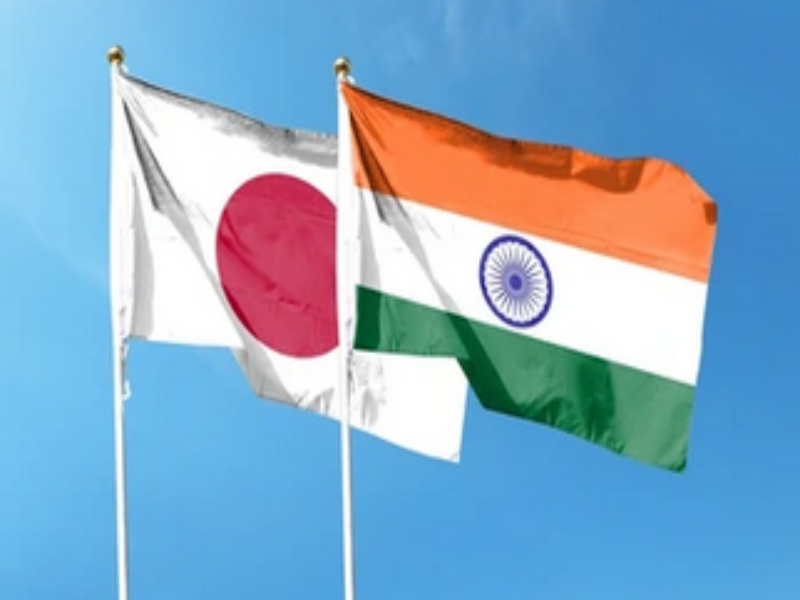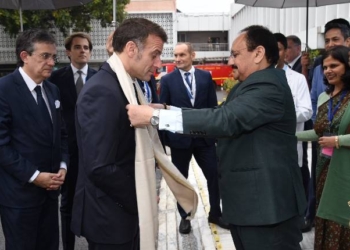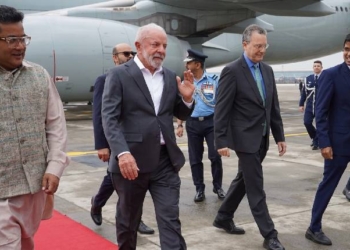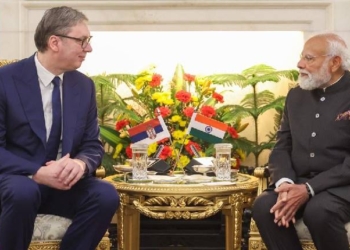New Delhi: Looking ahead, both nations must leverage their respective strengths — India’s strategic geography and expanding global influence, combined with Japan’s technological prowess and diplomatic reach — to secure the Indo-Pacific’s stability.
Indo-Pacific is fast becoming the epicentre of global security, and for India and Japan, the urgency of deepening strategic cooperation has never been more pressing.
In an era where authoritarian expansionism threatens sovereignty and disrupts regional stability, both nations must take decisive steps to reinforce a rules-based order that ensures peace and prosperity.
This was at the heart of discussions at a New Delhi-based think tank, the Centre for Integrated and Holistic Studies (CIHS), which hosted an event at the India International Centre in New Delhi on February 18, 2025.
Titled “Indo-Japan Relations”, the event featured Minister Noriaki Abe, Minister for Political Affairs at the Embassy of Japan, as the chief speaker, alongside a distinguished gathering of scholars, academicians, policymakers, and security experts.
Their discussions highlighted the necessity of fortifying India-Japan ties in an increasingly volatile geopolitical landscape.
Minister Abe provided critical insights into the evolving regional dynamics, emphasizing the need for deeper Indo-Japanese engagement. The discussions spanned economic collaboration, security partnerships, and technological cooperation—key pillars in ensuring regional resilience. A focal point was the increasingly assertive posture of the Communist Party of China (CPC) in the Indo-Pacific.
From aggressive military manoeuvres in the South China Sea to economic coercion and territorial incursions, CPC’s expansionist strategies continue to challenge the sovereignty of nations across the region. Its militarisation of artificial islands, debt-trap diplomacy, and grey-zone tactics have further escalated tensions, making a robust India-Japan partnership indispensable.
As two of the region’s leading democratic powers, India and Japan must intensify their security and economic cooperation to counter these challenges.
The informal Quadrilateral Security Dialogue (QUAD) grouping—which also includes the United States and Australia—has demonstrated its effectiveness in bolstering military interoperability, intelligence-sharing, and securing vital maritime corridors. However, a crucial area demanding greater attention is the security of the Malacca and Sunda Straits—chokepoints critical to global trade yet increasingly vulnerable to CPC’s geopolitical manoeuvring.
CPC’s growing influence in the region, particularly through its strategic presence in Myanmar and Cambodia, poses a direct challenge to freedom of navigation.
A coordinated Indo-Japanese approach—incorporating joint patrols, intelligence-sharing, and strategic infrastructure investments—is essential to maintaining stability. Japan’s advancements in maritime technology, coupled with India’s naval capabilities and strategic location, create a formidable alliance for safeguarding sea lanes.
Both nations have also heavily invested in maritime domain awareness (MDA), an essential component of deterring territorial encroachments and securing vital trade routes.
Beyond military security, economic resilience is equally critical.
China’s Belt and Road Initiative (BRI) has sought to entrench economic dependencies, eroding national sovereignty through unsustainable debt-driven projects.
In response, India and Japan have championed the Asia-Africa Growth Corridor (AAGC), a transparent and sustainable alternative that prioritises local economic empowerment over exploitative financing.
Strengthening this initiative is vital—not just to counter CPC’s economic coercion but to foster long-term regional stability.
The success of the AAGC hinges on increased investment in sustainable infrastructure, digital connectivity, and capacity-building in partner nations.
By promoting economic independence rather than dependency, India and Japan can help developing nations build resilience against external economic pressures. This initiative also unlocks new avenues for trade and investment, benefiting not just the Indo-Pacific but also Africa’s economic landscape.
The digital domain is another battleground where India and Japan must strengthen collaboration. China’s dominance in 5G networks, artificial intelligence, and digital infrastructure presents a clear security threat.
Beijing’s state-controlled tech firms have been instrumental in cyber espionage and geopolitical manoeuvring, necessitating a coordinated response.
By jointly investing in secure digital corridors, semiconductor supply chains, and advanced cybersecurity frameworks, India and Japan can safeguard critical technologies and infrastructure.
As the world moves toward an increasingly digital future, cyber threats loom large. Both nations must develop robust cyber resilience frameworks to counter state-sponsored hacking, misinformation campaigns, and intellectual property theft.
Japan’s expertise in advanced technology, coupled with India’s strong IT and cybersecurity capabilities, makes this partnership particularly well-suited to addressing emerging digital threats.
















